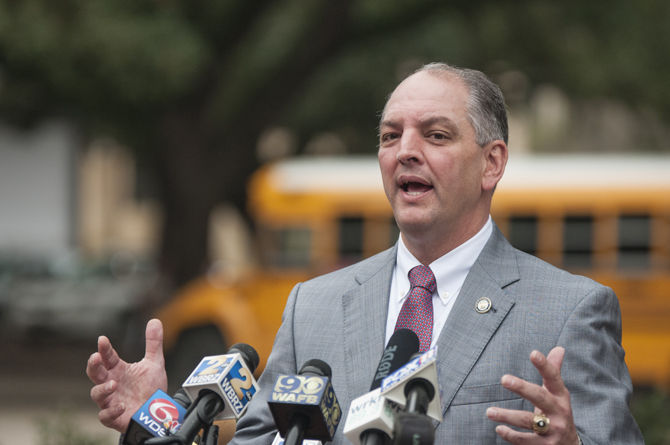By Rob Oldham
“Johhnnn Belll Edwudds.” A name so sweet and southern that you’d have thought he was a Republican.
John Bel Edwards, the newly-elected governor of Louisiana, is defying all expectations for Democratic politics below the Mason-Dixon. He is a white social conservative and the lone Democratic governor in the Deep South. In the 2015 gubernatorial election, Bel Edwards won 56 percent of the statewide vote, the most of any Democrat in a Louisiana governor’s race since Edwin Edwards defeated Ku Klux Klan Grand Wizard David Duke in 1991 with 61 percent of the vote.
Bel Edward’s victory is reminiscent of an earlier age in American politics when Democrats held an iron grip on the South. Republicans did not win a single state in the Deep South in presidential elections from 1876 to 1956. This was due to the Republican Party being “The Party of Lincoln,” that had put an end to the Confederacy and slavery during the Civil War. It was not until the mid-1960s, when Richard Nixon and Barry Goldwater turned the Party sharply to the right on social issues, that the Republicans became competitive. By the early 1990s, Republicans held most of the non-urban congressional seats in the South and were consistently winning the southern states in presidential elections. Democrats still held some sway in the Deep South—then-Arkansas Gov. Bill Clinton won Georgia and Louisiana in 1992—but many of these Democrats were much more conservative than the national party, falling somewhere right-of-center on the ideological spectrum. Moderate voting records did not help them though. Republican landslides in 2010 and 2014 vanquished the remaining conservative southern Democrats, including Georgia Representative John Barrow, the only white Democratic congressman left in the South.
History was against John Bel Edwards when he entered the 2015 Louisiana gubernatorial race. There was only one other Democrat serving in a statewide office in the Deep South and his opponent, Republican David Vitter, had won two U.S. Senate elections in 2004 and 2010. Vitter, who campaigned as a strong social conservative, won reelection in 2010 even though he had been implicated in a Washington, D.C. prostitution ring. Moreover, Louisiana had voted against Barack Obama in 2008 and 2012 by 20 percent margins. In 2014 voters ousted incumbent Democratic Senator Mary Landrieu despite her desperate attempt to win over conservative voters by championing the Keystone Pipeline in her final days in office. Clearly, Louisiana was not a friendly environment for Democrats.
But even in a red state, John Bel Edwards saw an opportunity to win. He was the Democratic Minority Leader in the State House, so he was reasonably well-known. More importantly, he was running against a weak incumbent who had revealed himself as a hypocrite with the prostitution scandal. Just months before the election, Vitter was viewed unfavorably by 51 percent of voters, including 44 percent of Republicans. Bel Edwards’ campaign took advantage of Vitter’s weakness. Attack ads contrasted his decorated military background with Vitter’s moral sleaziness, the most devastating one declaring that Vitter had chosen “prostitutes over patriots,” when he skipped a Senate vote honoring fallen soldiers to make a call to an escort service.
Vitter’s inadequacies do not tell the whole story of the governor’s victory though. Bel Edwards refused to give up the Democrats’ liberal economic platform to appeal to conservative voters. Instead, he doubled down on his criticisms of previous Gov. Bobby Jindal’s cuts to education and healthcare, pledging to use executive power to expand Medicaid on his first day in office. He also shored up his support among social conservatives by remaining pro-life, pro-gun, and anti-drug. His economically-liberal, socially-conservative policy stands were similar to those taken by the conservative southern Democrats after the New Deal. He might have even reminded voters of the last Edwards who was governor of Louisiana. Edwin Edwards was also an economic populist who leaned right on social issues and he was elected governor four times. Maybe Bel Edwards’ pro-Medicaid, anti-abortion platform resonated with a state that is among the poorest and most religious in the country.
So with the apparent success of Bel Edwards’ message and the rise of a new electoral coalition in Louisiana, could there be new formula for Democratic success in the Deep South? They could certainly use it after losing five southern gubernatorial elections and six southern senatorial elections in 2014. Democrats might be eyeing a southern resurgence with Bel Edwards’ strategy as the guiding light.
His success should not be misread though. There are other examples of southern voting trends in 2015 that are more instructive than Bel Edwards’ defeat of the scandal-ridden Vitter. In the Kentucky gubernatorial race, Matt Bevin, a Tea Party-style Republican, handedly won despite accusations that he had abused a former girlfriend. Bevin ran on an anti-Medicaid position even though Kentucky had expanded Medicaid under its previous governor, Democrat Steve Bershear, who was quite popular among voters. In Virginia, the most liberal state in the former Confederacy, Republicans maintained their majority in the State Senate even though many predicted they would lose.
These losses for Democrats illustrate the Party’s perpetual unpopularity in the South, unpopularity that may come more from the label “Democrat” rather than legitimate qualms with their policy goals. The South’s aversion to all things “Democrat” began with the uneasy Republican alliance formed in the 1960s. Many religious southerners were repulsed enough by the national Democrats’ social progressivism that they aligned with anti-tax, anti-regulation business leaders under the banner of the Republican Party. The factions have coexisted for 50 years even though there is no obvious connection between social and economic conservatism. The result is an incoherent blending of the religious right and business leaders who have one common goal: no more Democrats. Though the Democrats’ social policies appeal to many pro-business progressives and their economic policies would benefit impoverished rural communities with religious values, both groups have remained staunchly Republican. This may be because voters are fiercely loyal to their party labels, often changing their views on policy before changing their partisan affiliation. This loyalty to party labels over policy could partially explain why over half of Republicans support Medicaid expansion but continue to elect governors and legislators who reject it.
Apart from the disadvantage of their party label, Democrats also face a structural disadvantage in winning southern governorships. Almost every gubernatorial election south of the Mason-Dixon occurs in an off-presidential election year (North Carolina being the exception). High turnout during presidential election years typically favors Democrats while lower turnout in midterm elections helps the GOP. Republicans’ three biggest electoral sweeps (1994, 2010, and 2014) have been in midterm elections. Increased turnout might have pushed up-and-coming southern Democrats, like 2014 Georgia gubernatorial candidate Jason Carter, over the top in their elections. But without it, southern Democrats are typically relegated to small urban districts where their candidates must compete for legislative seats or mayoral offices. When the South’s vast rural landscape is brought into the fold in statewide elections, Democrats find it hard to win.
Yes, the South belongs to the GOP and it has not taken long for that to hit home for John Bel Edwards. Ever since Governor Huey Long ran the state during the 1930s, the governor has typically handpicked the Speaker of the House. The Republican majority in the State House (which gained three seats in 2015 despite Bel Edward’s victory) denied Bel Edwards the opportunity to do so for the first time in nearly 100 years. The governor next called a 25-day special legislative session to address the state’s financial woes. Republicans are not playing ball though, giving little ground on Bel Edwards’ proposed tax and spending increases.
As John Bel Edwards finds himself in tough battles with the Republican state legislature and sees his state embrace conservatives in the 2016 presidential election, he might want to start preparing for a tough reelection campaign in 2019. In 2015 he was elected over an unpopular incumbent who had betrayed his conservative bona fides. It is doubtful he would have done as well against a stronger opponent. Unfortunately for Democrats, Bel Edwards is not a trend setter or a resurgence candidate. He is the exception that proves the rule: conservatism reigns supreme in the South. Unless Gov. Bel Edwards finds a creative way to be a Democrat, but govern as a conservative, southerners will likely be sending him, and all Democrats, a clear message at the end of his term:
This is Republican turf and you best remember it.
This article originally appeared in the Spring 2016 edition of the Georgia Political Review magazine. It has been republished here.


